When it comes to "Michelin", what immediately comes to many diners mind is star food and delicate dishes. Once the annual "Michelin Guide" restaurants are announced in each major city, they will become hot destinations that "foodies" rush to check in.
Before gaining fame in the world of food, the 135-year-old Michelin Group (hereinafter referred to as Michelin) had another identity —— the global "tire giant", ranking first in the 2023 Global Top 75 Tire Rankings published by Tire Business. According to the latest financial report, Michelin's sales amount to €20.2 billion in the first 9 months of 2024.
As the world's largest automobile sales market, China has become one of Michelins key markets since 1988. Nowadays, with the rapid rise of new energy vehicles and the continuous change in public travel mode, how does Michelin adjust its strategy in the Chinese market?
"We are no longer satisfied with being just a tire producer and seller, but hope to become a provider of a better life." In 2024, National Business Daily (NBD) ushers in its 20th anniversary, and specially launched the "Wisdom of the Future - Global High-end Figures Interview Series", inviting industry leaders to talk about the future. In this context, Ye Fei, president and CEO of Michelin Greater China and Mongolia, accepted an exclusive interview with the NBD reporter.
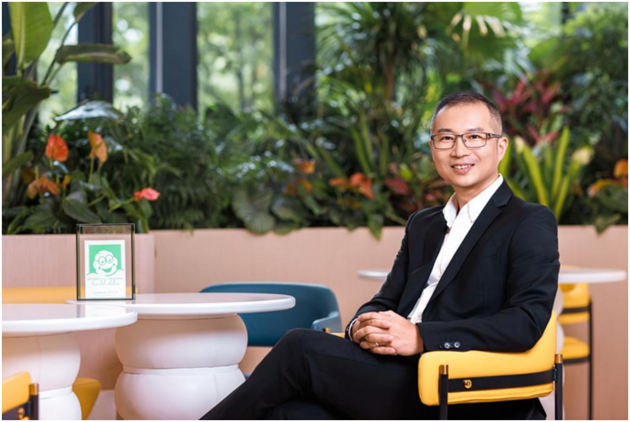
Ye Fei, President and CEO of Michelin Greater China and Mongolia (Photo provided by interviewees)
As a Michelin veteran, Ye Fei has been with the company for 24 years. Gradually promoted from a grassroots employee in sales and marketing to the company's senior management, he is the first Chinese person to be appointed as Greater China top manager in Michelins history. Ye Fei told the reporter that over Michelins 30 years of operation in China, the Chinese market has not only brought considerable revenue and profits to Michelin, but also served as an important market for enhancing the company's endogenous growth. What does Ye Fei think about the future changes in the transportation market? Under his leadership, how will Michelin "shift gears and speed up" in the Chinese market?
The "tire giant" has changed
"We no longer want to be a simple seller , but a provider of a better life"
Michelin, originated in France and started with the tires business, started from the partnership of Edouard Michelin and André Michelin in 1889. The two named the company after their own surnames, and successfully developed the world's first detachable bicycle tire in 1891, and then the advent of automobile pneumatic tires in 1895... Michelin, a century-old brand, has established its dominant position in the tire industry step by step.
According to Michelin's financial report, the company's total sales in 2023 were 28.3 billion euros(217.768 billion yuan), and the operating profit of the business line increased to 3.6 billion euros (27.702 billion yuan).
In the development of overseas markets, Michelin's story has gained more abundant "replenishment", especially in the Chinese market. According to the Analysis of the Development Status of the Automobile Tire Industry in 2024, the size of China automobile tire market in 2023 has reached 754.09 billion yuan, accounting for 34.8% of the global tire market.
Ye Fei told the National Business Daily that Michelin's role and positioning have also changed significantly in the past 30 years of development in the Chinese market.
In 1988, Michelin established its first sales office in Hong Kong, China; in the following year 1989, coinciding with the 100th anniversary of Michelin's establishment, it set up a representative office in Beijing; then in 1995, Michelin established its first joint venture in China in Shenyang. Eight years later, this joint venture was legally transformed into a sole proprietorship enterprise of Michelin in China.
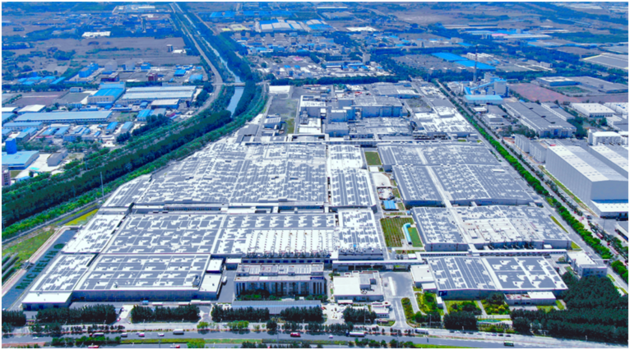
Michelin Shenyang factory (provided by interviewees)
From engaging in tire sales to building factories, and then to setting up the headquarters and R&D centers for the Chinese market in 2001, Michelin has frequently "shifted gears" in China. Today, Michelin has nearly 7,000 employees and five factories in the Chinese market.
In Ye Fei's view, the expansion of the tire business path serves as the cornerstone of Michelin's development in the Chinese market. Through tire products and services, Michelin has won the trust of a group of Chinese consumers and has been able to "land" in this initially unfamiliar market. The establishment of regional R&D centers and headquarters has allowed Michelin to better understand and adapt to the needs of the Chinese market and successfully "take root".
In addition to tires, Michelin's other trump card is "food".
Born in 1900, The Michelin Guide has long become Michelin's most important business. "It not only provides a pleasant life experience for global food lovers, but also helps the innovative development of the local tourism and catering industries." Ye Fei commented.
In 2016, the Michelin Guide launched a "taste-seeking journey" in Shanghai. So far, the Michelin Guide has landed in five cities in the Chinese mainland: Shanghai, Guangzhou, Beijing, Chengdu, and Hangzhou. Ye Fei revealed to reporters that the Michelin Guide will "take root" in more provinces and cities in the future.
Interestingly, Ye Fei also shared a detail with reporters: he was transferred back to China by the headquarters in 2022, and searched for "Michelin" on the Internet to see everyone's perception of the brand. Unexpectedly, the first thing that popped up in the search engine was content related to "food and restaurants". Instead of rejecting this, Ye Fei was surprised that Michelin had been integrated into the lives of the public. "When Chinese consumers embark on a journey to different cities, many people will follow Michelin to find food and the stories behind it."
On November 19, 2024, the 2025 Shanghai Michelin Guide was released. With a total of 145 restaurants on the list, it has quickly attracted evaluations from major bloggers and become a new "outlet" for short video content traffic. Ye Fei believes that it is meaningful and promising to continue to recommend high-quality restaurants to consumers in different cities . "We are pleased to see that many consumers, restaurant owners and chefs are pursuing a higher level of dining experience as the guidelines continue to be updated."
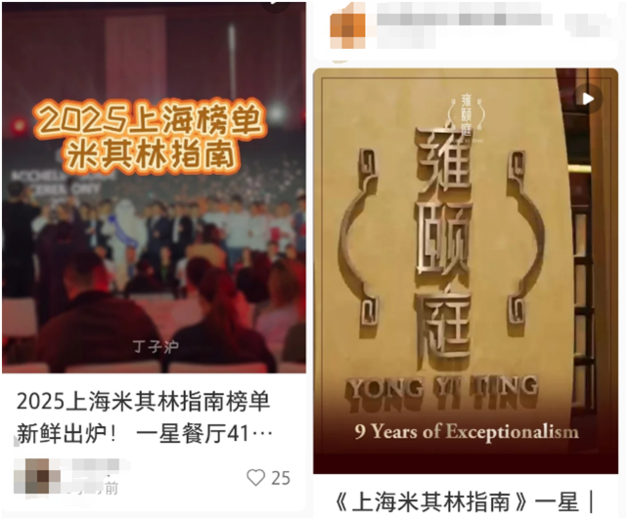
After the release of the "2025 Shanghai Michelin Guide", many bloggers posted their posts (short video screenshots)
"We are no longer satisfied with being just a tire producer and seller, but are committed to becoming a provider of a better life." Ye Fei told the reporter that from tires to food, from sales to services, in the process of exploring the intersection of "transportation" and "food", "today's Michelin is not only a leader in the global tire industry, but also brings people a life-changing complex and extraordinary experiences."
Competition is a booster for industry development
"We want all Michelin tires to be adapted to the requirements of new energy vehicles"
Analysis of the Development Status of the Automobile Tire Industry points out that the competition pattern of the global tire market is relatively stable while the competition being fierce. The traditional three giants, Michelin, Bridgestone and Goodyear, have long occupied the leading position in the global tire market, and the three together account for about 35% of the global market share.
Under the stalemate competition, the industry generally believes that the next outlet of the tire industry is hidden in the blue ocean of new energy vehicles.
Say goodbye to the roar and exhaust of traditional oil vehicles. New energy vehicles are attracting more and more consumers with their zero-emission environmental protection attitude and intelligent interconnected black technology. On November 14, the China Association of Automobile Manufacturers announced that Chinas annual production of new energy vehicles has exceeded 10 million for the first time. And China is also the first country in the world to reach an annual production of 10 million new energy vehicles.
"China's new energy vehicle market has a large scale, strong growth potential, sufficient market competition, high consumer acceptance, a complete industrial system, and promising prospects in the improvement of electrification, intelligentization and product competitiveness. The Chinese market also provide a continuous driving force for the electrification transformation of the global automotive industry." Ye Fei pointed out to the National Business Daily that China is the leaderin the transformation of new energy vehicles, but the industry competition is becoming increasingly fierce, requiring auto parts companies to continuously enhance their own strength.
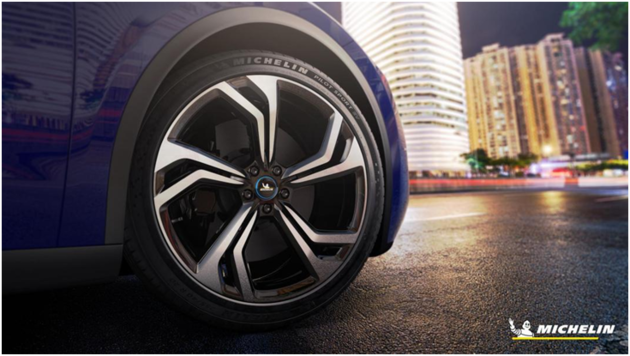
Michelin racing EV tires (provided by respondents)
Ye Fei is not afraid of competition. He can still recall that when he joined Michelin in the early 2000s, as a salesperson, his first assessment task was to stand on the side of the road with others and tell the tire sizes of all passing vehicles.
Whether for individuals or companies, Ye Fei believes that competition is a catalyst for innovation and transformation, while also being a booster for industry development. "Competition is conducive to the industry to make the cake bigger. Once companies compete in a track with good growth momentum, (performance) will also rise accordingly."
The latest data shows that in the high-end new energy vehicle market, Michelin's tire installation rate exceeds 30%. "The Chinese market, customers and consumers love innovative products and services, which also gives us more motivation to innovate." Ye Fei said that Michelin previously hoped to introduce innovative technologies to China, but now it hopes to let the excellent "Chinese experience" go abroad.
"Especially in the fields of new energy and intelligence, Michelin relies on cooperation with local automobile manufacturers to continuously improve product R&D and manufacturing, and some technologies and standards have been exported to the group." Ye Fei emphasized to the reporter, "We are not satisfied with having one tire merely suitable for new energy vehicles, but we want all Michelin tires to be fully adapted to the requirements of new energy vehicles and fuel vehicles."
Cultivate "people" as a project
Build the world's first "carbon neutral" production base in China
During his more than 8,000 days at Michelin, Ye Fei has worked in sales, marketing, strategy, operations, and senior management positions in the French and European markets. He has also worked in many countries including China, France and Romania, and managed business in nearly 30 countries. At the end of 2021, Ye Fei received the latest appointment from the group to return to China as President and CEO of Michelin Greater China and Mongolia.
Ye Fei has fully witnessed the fastest changes in the tire leader and the whole industry in the past 24 years. When talking to the National Business Daily about his gains in different jobs at Michelin, he said, "Edward, one of the founders of our company, has a famous saying, 'Don't judge a book by its cover, break the rock layer and you will find the diamonds hidden inside'. In terms of talent, Michelin does not regard people as production resources, but more as projects to cultivate. With the emergence of talents, innovation and business will also develop naturally."
Facing a market where consumer demands are increasingly diversified and personalized, Ye Fei said that Michelin's business layout in the Chinese market goes beyond tires into building a broader ecosystem. "Michelin is taking tires as a starting point and moving towards diversification, greening, and intelligence."
What will the future travel market be like? Michelin's innovation is still accelerating in tires which need to carry different car bodies and fuselages. Ye Fei believes that the challenge for an enterprise lies in not only the iteration of technology but also the leap of ideas. In this transformation, green and technology constitute a two-wheel drive system, leading the industry to a more sustainable and intelligent direction.
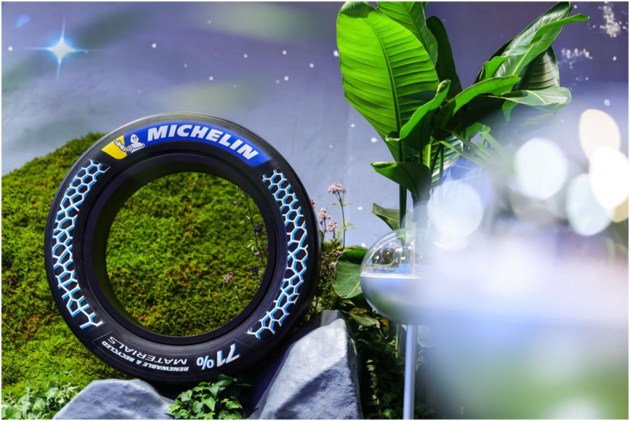
Michelin ‘Green Tires’ (provided by interviewees)
Michelin's "green tires" have frequently raised the benchmark in this industry. The percentage of sustainable materials in Michelin tires have raised from 46% in 2021 to 71% for the first time in Asia at the just-concluded Seventh China International Import Expo. "Green" refers to tires made of renewable and recyclable materials such as lemons, orange peels, natural rubber, and recycled carbon black.
"Currently, Michelin is planning for the future through investment and expansion of production." Ye Fei told the reporter that in order to better adapt to the development needs of the Chinese market, the second phase of the Michelin Shanghai factory reconstruction and expansion project started in 2023 will be completed by the end of 2026. "By then, the factory's annual production capacity of high-performance radial passenger tires will be increased to 9.5 million units. In addition, we are promoting the transformation and upgrading of the Shenyang factory to build Michelin's world first carbon-neutral production base."
"To achieve carbon neutrality in the transportation field, it is far from enough for one enterprise alone. It requires the joint efforts of the entire industry chain." Ye Fei knows it deeply, and thats why Michelin not only pursues green electricity and sustainable material in the production process, but also promotes the concept of sustainable development in the catering industry through the Michelin Guide.
Ye Fei believes that the concept of "everything is sustainable" must be put into practice. "At present, the Chinese market has entered a stage of high-quality development, and consumers have put forward higher demands. We will shift gears and speed up, take the initiative, seize new market opportunities, and create more ‘ecosystems’."
(Lv Yueyang also contributed to this article.)


 川公网安备 51019002001991号
川公网安备 51019002001991号





